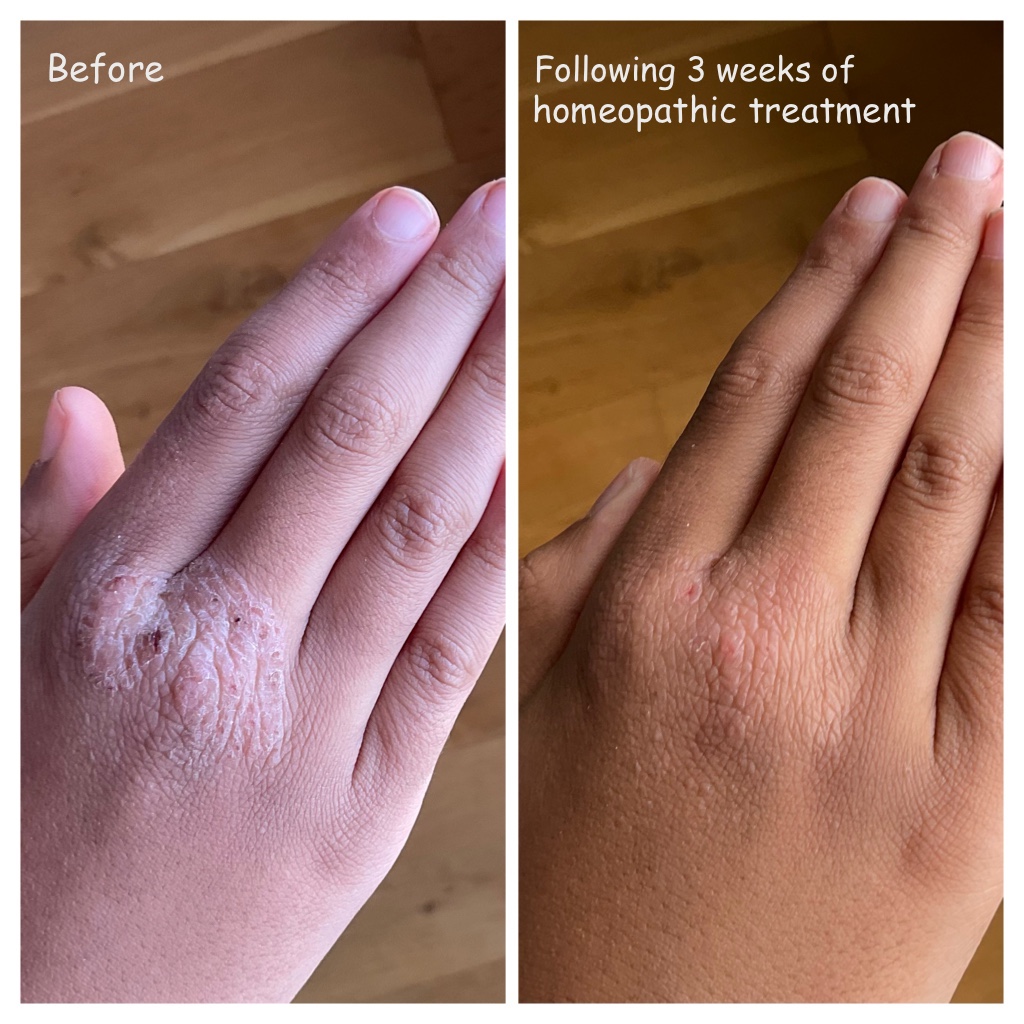
Formulated 200 hundred years ago by the German physician Samuel Hahnemann, homeopathy is a safe, gentle and natural system of medicine which stimulates the human body’s natural tendencies to heal itself. Today, over 500 million people worldwide use homeopathic treatments on a regular basis.

Although homeopathy has an impressive track record in treating a wide range of ailments, I have seen excellent results achieved in the treatment of a range of skin conditions, in the course of my practice. Often the patients who come to me have received conventional medical treatment for their skin conditions, but with varying levels of success. In search of a safer and less invasive cure, and often at the behest of a friend or family member, they decide to (often as a last resort and without much expectation!) give homeopathic treatment a chance. For the vast majority of these patients, my treatment proves to be effective and some are left pleasantly surprised.
A lovely little fellow aged eight years old was brought in by his mother complaining of a large stubborn patch of eczema on his hand. Thus far his mother had been using a topical ointment prescribed by their GP which would successfully alleviate the eczema, only for the complaint to return more viciously after a few months. This cycle had repeated a couple of times. The little boy’s symptoms included an incessant itch which he found difficult to resist scratching, often leading to bleeding at the site of the eczema.
As I investigated the case, two things became quite evident. The patient’s usual bowel activity was sluggish and meant he opened his bowels every 2-3 days. This routine would sometimes go off-track with occasional bouts of constipation, where 4-5 days would pass without activity. Homeopathic theory suggests a vital link between the bowels’ efficacy in eliminating toxins from the body and the consequent effects on the skin when such toxins are not efficiently removed. This combined with the boy’s continued use of the topical ointment resulted, in my view, in driving the eczema deeper.
As the skin is a highly reactive organ, ascertaining the cause-and-effect relationship is vital in helping to build up a picture of what is going on inside. It is not uncommon for me to see a patient suffering from eczema but who also suffers from say, constipation or an over reactive immune system or dysbiosis (disturbed ecology of gut microbiome). Similarly, hormonal imbalances in adolescents hitting puberty, and/or during the premenstrual stage in females, can cause a breakout of acne. Stress and anxiety can be seen time and time again causing inflamed, reddened and itchy skin in some patients. And there are many other skin conditions which are rooted in some sort of internal imbalance.
So, in tandem with the homeopathic doctrine of holistic healing, I proceeded to prescribe the homeopathic remedy Nux Vomica to my young patient, with the aim of providing safe and gradual support to the bowels in achieving their natural rhythm. This remedy encourages peristalsis-a series of wave like muscle contractions that move food through the digestive tract. Although it remains true that Nux Vomica is highly effective in treating sluggish bowels and has not disappointed me in the course of providing treatment to patients, it also remains the case that such treatment cannot be used indiscriminately, since each patient’s specific individual symptoms will determine the eventual choice of remedy.
I further prescribed another homeopathic remedy- Graphites, to my young patient. This remedy is particularly beneficial for eczema located on the hand with a crust-like presentation, and which is sometimes accompanied by clear fluid. My case notes ticked off most of these symptoms. The time and diligence taken to match individual symptoms with those of the remedy is pivotal in prescribing homeopathic treatment.
Providing lifestyle and dietary advice to my clients is central to my practice. Often, adjusting dietary preferences in conjunction with homeopathic protocols produce excellent results. For my patient, I advised less junk food and less refined carbohydrates for the period of the treatment. I recommended that his diet be adjusted to include more soluble and insoluble fibre in the form of fruit, vegetables, beans, potatoes and cereals.
Homeopathic treatment can sometimes cause an initial flare-up of symptoms. For a first-time patient this may be disheartening but in fact such flare-ups are a positive sign as they show that the suppression of symptoms is abating, toxins are being off-loaded and the body is on course to healing itself naturally. My little patient also experienced a mild flare up of symptoms followed by a steady improvement.
Three weeks after my patient began homeopathic treatment, the results were highly satisfying- the eczema patch had cleared by around 90%, there was no longer any itching, and the little boy was opening his bowels on a regular basis. His appetite and quality of sleep had also significantly improved. His mother was impressed with the results, particularly of the fact that she had initially contacted me for her child’s eczema but had as an added bonus seen a general improvement in his health and well-being.
This is how homeopathy works; its approach is holistic, and one that offers sustained cures in a safe and effective manner. As homeopaths are often inclined to say “homeopathy treats the person, not the disease”.
First published in Wellbeing magazine on 27 June 2022
Bio
Haroon Ashraf is a homeopath based in London, where he offers consultations in person and online. Haroon specialises in treating skin and gut conditions. Please visit his homeopathy practice at https://holistichomeopathy.co.uk/ for more information.